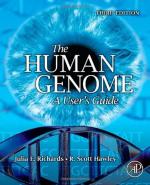|
This section contains 1,126 words (approx. 4 pages at 300 words per page) |

|
The word "genome" means the totality of all the genetic information present in the cells of an organism. Most of this genetic information is contained in chromosomes. A chromosome consists of deoxyribonucleic acid (DNA) molecules wound up into a compact bundle. Humans have 46 chromosomes in their cells, organized into 23 corresponding pairs.*
*If a single strand of human DNA were unwound and stretched out, It would be over two meters long.
 Scanning electron micrograph of a human × chromosome.
Scanning electron micrograph of a human × chromosome.
The DNA in the chromosomes of an organism consists of a double-stranded molecule formed from four basic units that are repeated many times. The four basic units are called nucleotides. Each nucleotide is made of a sugar, a phosphate group, and a nucleotide base. The sugars in the nucleotides stack up and link together to form a backbone for one strand of the DNA molecule, leaving the nucleotide bases...
|
This section contains 1,126 words (approx. 4 pages at 300 words per page) |

|


